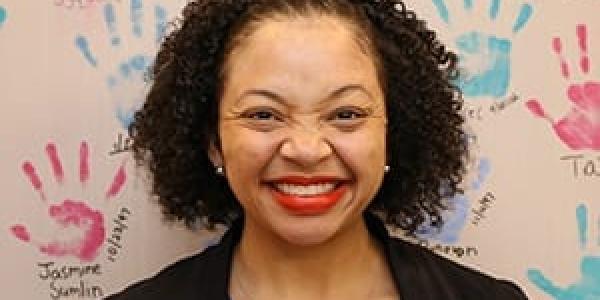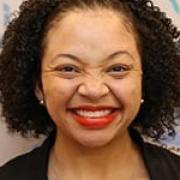From Our President. Activating Our Best in Leadership: Stretching and Extending Toward Our Collective Mission

You are here
In this issue of Young Children, we explore leadership and leading in early childhood education. When I reflect on being a leader, leading, and leadership, I am reminded of a quote shared by John S. Mbiti, a Kenyan philosopher, that captures a concept rooted in African philosophy: “I am because we are; and since we are, therefore I am.”
It is my belief and experience that an effective leader takes ownership of the responsibility and task of leading while also understanding that their success reflects collective action with the community. As a leader, my success reflects the success and support of those I’m leading. Therefore, if someone compliments a successful outcome of my leadership, you will likely hear me say, “I am because we are, we are because I am.”
One of the messages I’ve communicated in this column has been the power of with and the role we each have in promoting equity in early childhood. How do we lead with children, families, colleagues—especially those who are often marginalized and not provided access to high-quality and culturally responsive early learning experiences? How do we lead with the intention of modeling equitable, high-quality, and culturally responsive early learning experiences? How do we lead with influence, trust, and respect so that children, families, and colleagues choose to follow and are not just required to do so? How do we lead with our talents, gifts, and privileges to optimize individual and collective action?
Take a moment to reflect on these questions, the ways you are currently leading with intention, and your successes that reflect your community.
As a teacher educator within the Birth Through Five Program at Georgia State University, I see teacher candidates leading in various ways. Our teacher candidates demonstrate leadership in their classrooms and communities. Their leadership is transformative and represents the collective action and success of the children and communities they teach and serve. They lead children in experiences that are developmentally appropriate and that support their holistic development. They lead advocacy efforts to petition for safer walking zones or more access to fresh fruits and vegetables in their neighborhoods. They host a book fair that features more diverse authors and perspectives. Teacher candidates also lead by modeling for others how to aspire to and achieve high-quality early childhood education for every child, and they model career goals even as they face significant social determinants of health and financial barriers.
For example, most teacher candidates in our program are leading classrooms while pursuing a full-time college schedule. Many experience food and housing insecurity, and some face health challenges. Still, they show leadership, grace, and unbridled determination. One student in particular, Ms. Shanequa, demonstrated these qualities as she battled a type of lymphoma while teaching preschool full time and pursuing her degree and certification. She successfully earned both last fall, and she is thriving in her health and early education career. (Read more about Ms. Shanequa, her leadership, and her journey in Georgia State’s news story “Graduate of Birth Through Five Education Program Inspired by Her Children.”)
It is great in early childhood when our leadership efforts are recognized by others. Therefore, I’d like to take a moment to provide kudos to NAEYC’s CEO, Michelle Kang, who has taken on the responsibility and the task of leading critical issues and needs in our field. In early May of this year, Michelle was awarded the Visionary Leadership Award from the McCormick Center for Early Childhood Leadership, which commemorates the work, memory, and spirit of Paula Jorde Bloom (founder of this center). Michelle was honored for her work toward increased compensation and professional recognition for early childhood educators, her dedication to elevating their voices, and her advocacy for greater systemic investment in early childhood education. Please join me in congratulating Michelle for her leadership and championing for all children, families, and early childhood professionals. (Read more about NAEYC leaders and leadership in “NAEYC’s Leadership in Promoting High-Quality Early Learning for All Children: Recent Initiatives” below.)
NAEYC’s Leadership in Promoting High-Quality Early Learning for All Children
Recent Initiatives
Being a leader includes modeling for others how to navigate challenges while staying focused on the task you are charged to lead. NAEYC continues to be the US leader in promoting high-quality early learning for all young children. Its Governing Board has worked with and supported NAEYC staff and leaders to help achieve the Association’s mission of promoting high-quality early learning for all children.
One major initiative has involved NAEYC’s position statements. In the Summer 2025 issue of Young Children, NAEYC Governing Board member Stacey French-Lee shared the latest information about the revision of “Early Childhood Program Standards.” In addition, this year the “Code of Ethics for Early Childhood Educators” has been revised for the first time since 2011. The Code has been updated and streamlined so that all practitioners—including early childhood educators, administrators, and adult educators—can use it to guide and defend ethical conduct and decision making, especially when navigating complex situations with professional judgment and integrity.
This revision has emerged from a multiyear process that included a robust public comment period engaging hundreds of educators across all states and settings. It also reflects the guidance of more than two dozen early childhood and ethics experts serving on the revision workgroup and the NAEYC Governing Board.
With its release, this version of the Code becomes the fifth and final foundational position statement NAEYC has written or revised since 2019. These five foundational documents—which the organization holds with and on behalf of the early childhood education profession—are designed to work together. For example, the ethical responsibilities of early childhood educators described in the latest Code work together with the “Professional Standards and Competencies for Early Childhood Educators” in laying out the model professional practices that promote the development, learning, and well-being of young children. (Watch Young Children for more about the position statements and their uses.)
In addition, Governing Board members are excited to lift up these recent key accomplishments from NAEYC in our collective work to promote high-quality early learning for all children:
- Redesigning NAEYC’s accreditation system and process, so it is easier to navigate and has more diverse quality assessment and accreditation options
- Leading the field in DAP resources and professional supports, including resources created just for you
- Revamping NAEYC’s membership portal, including new interactive features and digital resources
- Launching a new, member-exclusive magazine, Educating Young Children, with its second issue packed with practical ideas and examples about educator well-being
- Providing ongoing feedback and strategic direction through NAEYC’s early childhood education workforce surveys
- Creating the new Early Childhood Education Higher Education Faculty Newsletter, which you can sign up for now
- Debuting the “Professional Standards and Competencies for Early Childhood Educators” Resource Library, which is a hub of resources centered on this position statement
- Offering the new Advocacy in Action newsletter and advocacy resources to keep you up-to-date on early childhood policies and advocacy opportunities
There is more to come to ensure NAEYC is leading efforts toward our collective vision that all young children learn and thrive in a society dedicated to ensuring they reach their full potential.
Shortly after Michelle’s recognition, Dr. Barbara Cooper, a NAEYC Governing Board member, was honored with the 2025 Early Childhood Education Alumni Leadership Award given by the University of Colorado Denver School of Education and Human Development (SEHD). The award “recognizes extraordinary SEHD alumni whose leadership exemplifies the school’s mission to engage in inclusive leadership practices that seek to advance early childhood education in the State of Colorado and across the nation.” We witness firsthand Barbara’s leadership and contributions on the NAEYC Board and her commitment to championing educational equity. I’m delighted that SEHD also recognized her transformative, impactful leadership and collective action within the community while leading in early childhood.
Whether I’m writing in Young Children or providing a keynote during NAEYC conferences, I often reference three things: Stories of teachers/teaching, anecdotes from my young children or family, and connections to Beyoncé. Therefore, I cannot end this article without a reference to my children and to Beyoncé.
Beyoncé is a distinguished artist who has led the rhythm-and-blues field in fashion, art, and entertainment. Cowboy Carter, her latest album and tour, is an example of how she leads and extends her talents within the country music genre, ultimately transforming it. Beyoncé has broken barriers, provided access for other Black country music artists, and elevated this genre to new audiences. So, I ask you: What is your Cowboy Carter? What is that initiative you’ll lead to advance early education for the children and families in your community? How will you lead this effort, even when it is a new topic or area? Who will you collaborate with? What professional resources will you seek to learn to be able to lead?
My Cowboy Carter is leading and supporting our workforce in cultivating a community of care and wellness—grounded in our talents, resources, and gifts—to advance educational equity. This is a new area for me: I’m beginning to explore and learn more about how we can be happy, healthy, and whole so that we can do the good work, the exhausting work, the hard work on behalf of children, families, and communities. More and more, I’ve come to see educator well-being and self-care as an area in need of support for the teachers I teach.
Lastly, in effective leadership, we must learn from children and be open to opportunities in which they show us how to lead. My 7-year-old son, Frederick, is an avid (and pretty good) soccer player. This past May, he played seven games, in four different positions, against children two to three years older than him, in 100-degree heat. He and his team went on to become the division champions at the Capital Cup tournament in Tallahassee, Florida. When his father and I asked him how he felt to be a champion and team leader, his response was “I am best when I am my best.”
Let’s lead in our best by being our very best for children, families, and each other each day!
Onward and upwards in early childhood education!
Copyright © 2025 by the National Association for the Education of Young Children. See Permissions and Reprints online at NAEYC.org/resources/permissions.
Tonia R. Durden is president of the National Association for the Education of Young Children.
